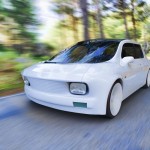 Various projects have been undertaken to make automated vehicles smarter. For instance, I wrote last year about the German UR:BAN project that aimed to make urban traffic safer and more efficient.
Various projects have been undertaken to make automated vehicles smarter. For instance, I wrote last year about the German UR:BAN project that aimed to make urban traffic safer and more efficient.
This involves a heightened level of sensing the environment that will provide an inevitable stepping stone towards full automation. Another nice example is the Vehicular Ad-Hoc Network (VANET) being run by Middlesex University.
Smarter motoring
VANET hopes to help bring about the next wave of driverless cars, autonomous trains and always locatable planes. The VANETs aim to integrate transport and communication infrastructures via a range of communication devices known as Roadside Units (RSUs).
These connect to your car via an Onboard Unit (OBU), and the subsequent rapid flow of information between these things helps to prevent collisions, notify authorities of accidents and so on.
These networks will also support the delivery of infotainment type information to our cars, whether this is live news and traffic updates, video games and so on.
Fertile ground
The university are hoping to support innovation in this area through the creation of the Middlesex VANET Research Testbed, which is the first of its kind in the UK.
The group are actively looking for people to participate in trials, and are keen to install OBUs in vehicles for a period of time as you drive around the area, with the aim being to gain an understanding of the traffic in that part of town. The group have also developed OBUs for cyclists and pedestrians.
It’s certainly an interesting project, and if you’d like to participate, you can contact Arindam Ghosh or alternatively visit the VANET website.
Human advancement in technology is simply limitless. It sure will be very interesting to see the intrigues involved in a real time situation where you find SDV vs some 007 human drivers on the streets and highways.
Time to realise that a computer is far better than a human, not impatient, no road rage, school runs by Chelsea tractors (hopefully). Hundreds of variables that are removes at a stroke. Unsafe-don't ever get on a rail commuter train at many airports and never get into a passenger aircraft. Those are the most visible examples of safer operation, there are thousands of similar situations in industry where human error has been taken out of the equation by the electronic speed and analysis of probability that humans cannot possibly match. One cannot build envy, jealousy, impatience and sheer carelessness into a control system. We can also design a far better passenger environment as control is relinquished to computers. No more drunk driving! Worth thinking about.
Gotta say, I'm a big fan of the driverless car. Humans have been found wanting behind the wheel.
Total eradication of alcohol and drug related accidents? Yes please.
I feel for the truckers who like a lot of workers are going to get royally shat on. But that's a wider economic problem that technology is create across sectors.